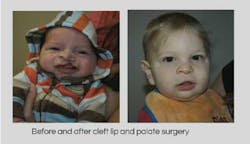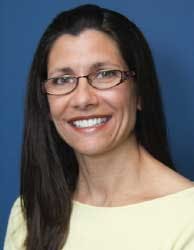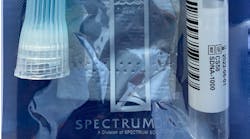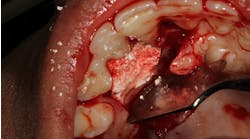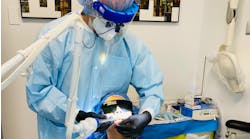Tampa dental surgeon raises donations for cleft and craniofacial awareness and prevention on behalf of local children
July 18, 2013
Pat Ricalde, DDS, MD, FACS, of the Florida Craniofacial Institute provides specialized, expert care for infants and children born with abnormalities of the face and head, such as cleft lip and palate. July marks National Cleft and Craniofacial Awareness and Prevention Month and the kick start of the Florida Craniofacial Institute’s campaign to spread understanding and raise funds to help local families affected by a craniofacial anomaly.RELATED |Cleft lip and palate present different challenges throughout child development In honor of these Bay Area families, the Florida Craniofacial Institute wants to create a supportive, community environment, and is also collecting donations and selling fun items to contribute all proceeds to the St. Joseph's Children's Hospital Cleft and Craniofacial team patients.RELATED |How mothers of children with orofacial clefts view barriers to accessing care
All money raised will go directly toward supporting these families with needed items such as specialized bottles, or basic assistance during treatment like gas and groceries. No proceeds will be used for health care costs. The Florida Craniofacial Institute office is located at 4200 North Armenia Avenue in Tampa and is open Monday through Thursday 8 a.m. to 5 p.m. and Friday 8 a.m. to 2 p.m. One story of hope and inspiration comes from two-year-old Quinten Mason and his family. “Dr. Ricalde truly cares for all of her patients and it shows in her medical practice. Quinten would not have had the outcome that he did if not for her wonderful surgical skills and the cleft care team she put together for us,” said Robin Mason, Quinten’s mother. “She is a gifted clinician with a caring beautiful heart.”
All money raised will go directly toward supporting these families with needed items such as specialized bottles, or basic assistance during treatment like gas and groceries. No proceeds will be used for health care costs. The Florida Craniofacial Institute office is located at 4200 North Armenia Avenue in Tampa and is open Monday through Thursday 8 a.m. to 5 p.m. and Friday 8 a.m. to 2 p.m. One story of hope and inspiration comes from two-year-old Quinten Mason and his family. “Dr. Ricalde truly cares for all of her patients and it shows in her medical practice. Quinten would not have had the outcome that he did if not for her wonderful surgical skills and the cleft care team she put together for us,” said Robin Mason, Quinten’s mother. “She is a gifted clinician with a caring beautiful heart.”
A cleft lip and palate occurs when the tissue that forms the roof of the mouth and upper lip fail to join while a fetus is developing. The Cleft Palate Foundation reports that about one in 700 babies in the United States are born with a cleft lip and/or cleft palate. The cleft, or split, can range from a small notch on the upper lip to a large gap that runs through the palate and into the nose. This not only alters the child’s appearance, it also affects normal functions such as feeding, speech and hearing, and can include social and psychological challenges later in life. Andy and Robin Mason found out Quinten would be born with a cleft lip and palate during an 18-week ultrasound. The expectant parents were determined to get all of the information they could on treatment options and started researching online, reading books on facial abnormalities, and talking to specialists immediately. “I was so scared,” shares Robin. “I thought that Quinten wasn't going to be able to eat and that I wouldn't be able to bond with him. Fortunately, I found St. Joseph's Children's Hospital and a team of specialists run by Dr. Ricalde.” The Masons started meeting with their cleft care team regularly, who showed them prenatally how to use special bottles and feeding techniques, and educated them on what to expect after Quinten was born. “To treat this disorder properly, a child will often need several surgeries within the first year of their life. That is why it is especially important for more people to be aware of this condition so they understand the need to start treatment as early as possible and they realize the benefit of working with a highly-trained and multi-disciplinary clinical team,” explains Dr. Ricalde. At six-weeks-old, Quinten underwent a rhinoplasty and lip repair, and at 10-months-old required a palatoplasty to facilitate cleft fusion. “It turns out the surgeries, although very challenging, were a major bonding time for us,” says Robin. “Quinten is an amazing child. No one can ever tell he went through the surgeries. He is a happy, curious, and outgoing boy who loves to eat and play. He is now in day care and his speech is on pace with other children his age.” Robin’s advice for other parents with a child diagnosed with this condition is to seek support from health care workers, family and friends. “If you don't feel comfortable with any part of a treatment plan, seek out second and third opinions. Also, don't forget to enjoy your child. Even though you will spend some time in the hospital, children want to laugh and play and be kids, so let them.” For more information on how to help the Florida Craniofacial Institute raise donations for the St. Joseph's Children's Hospital patients, come by, contact us at (813) 870-6000, or visit www.floridacranio.com.
Pat Ricalde, DDS, MD, FACS, founded the Florida Craniofacial Institute with a focus on craniofacial trauma and reconstructive surgery, the management of congenital craniofacial anomalies, orthognathic and other jaw surgery, head/neck pathology, dentoalveolar surgery, dental implants, and bone grafting. As the founder and director of the Cleft and Craniofacial Team at St. Joseph’s Children’s Hospital, Dr. Ricalde is dedicated to providing quality care to patients, especially to those with special needs here in the Tampa Bay area. Dr. Ricalde spends a great deal of time educating other surgeons and physicians by giving lectures, publishing articles and book chapters, as well as working internationally to treat underserved children.
